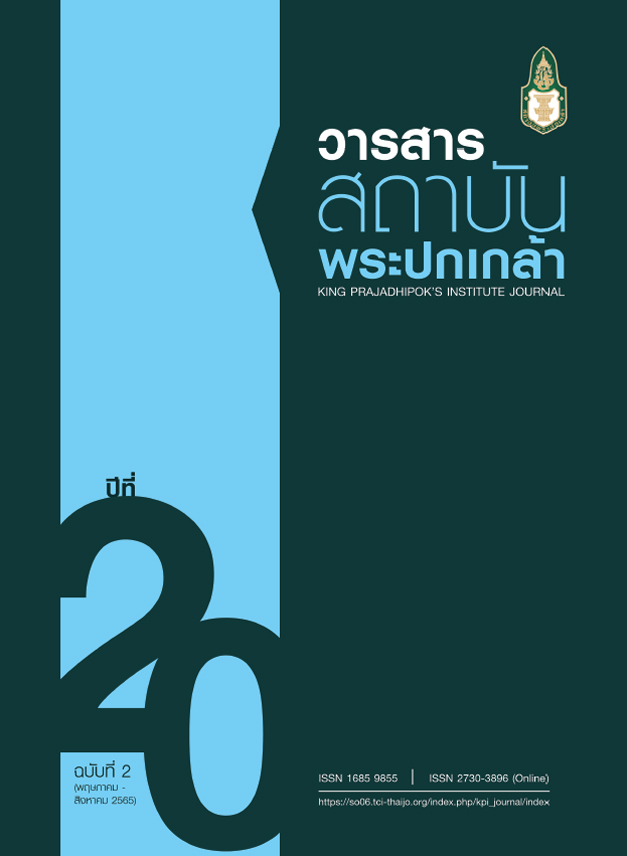An Analysis of Social Networks for Driving Bangkok’s Learning City Concept A Case Study of Kadeejeen-Khlongsan Neighborhood
Main Article Content
Abstract
UNESCO's learning city concept is a concept that encourages local authorities and networks to develop strategies for developing cities to enable lifelong learning in order to promote human resource development in response to the needs of knowledge-based socio-economic change, and to solve the problem of inequality. Government agencies and various other sectors in Thailand are adopting this concept and applying it to drive urban development. Bangkok is a locality that has potential and problems suitable for applying this concept as a policy guideline in practice. This research aims to study the social network that drives Bangkok’s learning city concept To analyze the situation, role, and potential of relevant social networks in order to understand members and networks before strategic planning to drive development. This will help make the development plan more efficient through an understanding of the potential, opportunities, and limitations of members and networks. Using a measure-based centrality analysis, the study focuses intensity, diversity, and roles of network members.
This research is concentrated in Kadeejeen-Khlongsan neighborhood. Since Bangkok is a Special Administrative Region with a larger area than other cities, it is imperative to choose a study area that is similar in size to a “city” or municipality according to UNESCO's definition of a learning city. The selected area has both physical capital and social capital in that it has Bangkok’s second largest set of public facilities utilities that promote learning, various social networks, and the basic factors for driving the city of learning according to the UNESCO concept. These three elements were analyzed by collecting data using practical research methods through a participatory process, specifically in focus groups and workshops. From the study, it was found that networks in driving Kadeejeen-Khlongsan neighborhood’s learning city concept exist as a distributed network. Potential members from various sectors support each other's operations to drive the development of the neighborhood.
However, there are limitations from the management of the Bangkok Metropolitan Administration, mission and project-based development, and limitations of network members. These lead to the proposal that drives the learning city concept in Bangkok, which proposes to connect networks with other networks, create a neighborhood learning platform, and build up citizen or volunteer learning city districts through network collaboration. Supporting the long-term dynamics of urban development with the learning city concept responds to the needs of knowledge-based socio-economic development and future changes, including increased inequality. The process and proposal in this research could be applied and reproduced in other neighborhoods and cities in Thailand to increase the efficiency of policymaking and urban development planning.
Article Details

This work is licensed under a Creative Commons Attribution-NonCommercial-NoDerivatives 4.0 International License.
@ 2020 King Prajadhipok's Institute The Government Complex Commemorating All Right Reserved.
References
ภาษาไทย
กองทุนเพื่อความเสมอภาคทางการศึกษา และ The101.world. (2563, 28 มกราคม). การศึกษาโลกสะท้อนไทย ความเหลื่อมล้ำที่ยังไม่หายไป. สืบค้นจาก The101.world: https://www.the101.world/global-and-thai-education/
ธนาคารแห่งประเทศไทย. (2562). ภาพรวมความเหลื่อมล้ำของไทยในศตวรรษที่ 21. กรุงเทพฯ: ธนาคารแห่งประเทศไทย.
นิรมล เสรีสกุล และคณะ. (2564). โครงการศึกษาบทบาท ศักยภาพ และพัฒนาดัชนีชี้วัดการขับเคลื่อนเมืองการเรียนรู้แห่งอนาคต กรณีศึกษากรุงเทพมหานคร. กรุงเทพฯ: หน่วยบริหารและจัดการทุนด้านการพัฒนาระดับพื้นที่ (บพท.).
มานา ปัจฉิมนันท์. (2560). การวิเคราะห์เครือข่ายทางสังคมกับการวิจัยด้านการสื่อสารในองค์การ. วารสารสถาบันพระปกเกล้า, 15(3), 5-18.
วสันต์ เหลืองประภัสร์. (2559). การรวมศูนย์อำนาจและการกระจายอำนาจกับการบริหารราชการแผ่นดินไทย: การทบทวนแนวคิดข้อถกเถียงและข้อพิจารณาเพื่อการปฏิรูป. วารสารสถาบันพระปกเกล้า, 13(1), 98-124.
ศุภสวัสดิ์ ชัชวาล. (2547). สารานุกรมการปกครองท้องถิ่นไทย หมวดที่ 2 โครงสร้างภายนอก ลำดับที่ 4 โครงสร้างการบริหารราชการแผ่นดินกับการปกครองท้องถิ่น. นนทบุรี: สถาบันพระปกเกล้า.
สมพงษ์ จิตระดับ สุอังคะวาทิน. (2560, 29 ธันวาคม). การศึกษาไทย กระบวนทัศน์ที่หลงทาง. สืบค้นจาก https://www.matichon.co.th/education/news_783532
สำนักงานเลขานุการของคณะกรรมการยุทธศาสตร์ชาติ. (2562). ยุทธศาสตร์ชาติ พ.ศ. 2561 - 2580 (ฉบับประกาศราชกิจจานุเบกษา). กรุงเทพฯ: สำนักงานเลขานุการของคณะกรรมการยุทธศาสตร์ชาติ สำนักงานคณะกรรมการพัฒนาการเศรษฐกิจและสังคมแห่งชาติ.
สำนักงานสภาพัฒนาเศรษฐกิจและสังคมแห่งชาติ. (2562). สรุปสาระสำคัญของแผนปฏิรูปประเทศ.
สืบค้นจาก http://nscr.nesdb.go.th/wp-content/uploads/2020/12
ภาษาอังกฤษ
Baran, P. (1964). On Distributed Communications. California: The RAND Corporation.
Etzkowitz, H., & Dzisah, J. (2008). Rethinking Development: Circulation in the Triple Helix. Technology Analysis & Strategic Management, 20(6), 653-666.
Gross, R. (2015). Psychology: The Science of Mind and Behaviour. London: Hachette UK.
Hammond, L. D., Austin, K., Orcutt, S., & Rosso, J. (2001). How People Learn: Introduction to Learning Theory. California: Stanford University.
Knight, R. V. (1995). Knowledge-based Development: Policy and Planning Implications for Cities. Urban Studies, 32(2), 225–260.
Liu, W., Sidhu, A., Beacom, A. M., & Valente, T. (2017). Social Network Theory. In P. Rossler, C. A. Hoffner, & L. v. Zoonen, The International Encyclopedia of Media Effects (pp. 1-12). Hoboken: John Wiley & Sons.
Luksha, P., Cubista, J., Laszlo, A., Popovich, M., Ninenko, I., & participants of GEF. (2018). Educational Ecosystems For Societal Transformation. Amersfoort: Global Education Futures Foundation.
Scott, J. (2017). Social Network Analysis. (4th Edition). London: SAGE Publications Ltd.
Silk, M. J., Croft, D. P., Delahay, R. J., Hodgson , D. J., Boots , M., Weber, N., & McDonald, R. A. (2017). Using Social Network Measures in Wildlife Disease Ecology, Epidemiology, and Management. Bioscience, 67(3), 245-257.
The World Bank. (2018). World Development Report 2018: Learning to Realize Education’s Promise. Washington, DC: The World Bank Group.
UNESCO Institute for Lifelong Learning. (2015). UNESCO Global Network of Learning Cities: Guiding Documents. Hamburg: UNESCO Institute for Lifelong Learning (UIL).
Valdes-Cotera, R., Longworth, N., Lunardon, K., Wang, M., Jo, S., & Crowe, S. (2015). Unlocking the Potential: Case Studies of Twelve Learning Cities. Hamburg: UNESCO Institute for Lifelong Learning (UIL).
Wasserman, S., & Faust, K. (1994). Social Network Analysis: Methods and Applications. Cambridge: Cambridge University Press.
WEI, M., SUN, J., & SHI, Y. (2015). Research on the Higher Education Ideas in Ancient Greece and its Modern Values. Cross-Cultural Communication, 11(8), 11-14.
Yigitcanlar, T., & Inkinen, T. (2019). Geographies of Disruption: Place Making for Innovation in the Age of Knowledge Economy. Cham: Springer.


